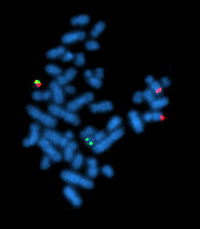
Photo from wikipedia
Although Philadelphia chromosome-positive acute leukemia (Ph+-ALL) has been revolutionized with tyrosine kinase inhibitors (TKIs), resistance and mutation are universal events during treatment with first-generation and second-generation TKIs. The present third-generation… Click to show full abstract
Although Philadelphia chromosome-positive acute leukemia (Ph+-ALL) has been revolutionized with tyrosine kinase inhibitors (TKIs), resistance and mutation are universal events during treatment with first-generation and second-generation TKIs. The present third-generation TKI has a dose-dependent, increased risk of serious cardiovascular events and the sensitivity is poor for patients with ≥2 mutations accompanied by the T315I mutation. Thus, novel and well-tolerated TKIs should be explored. This study analyzes the efficacy and advert effects of olverembatinib, a novel third TKI, in the treatment of newly diagnosed adult Ph+-ALL in induction therapy. Four adult patients with newly diagnosed Ph+-ALL were treated with olverembatinib as the first-line treatment. For induction therapy, these patients received 40 mg of oral olverembatinib quaque omni die for 28 days, 1 mg/kg/d of prednisone for 14 days, then tapered and stopped at 28 days and vindesine 4 mg/d at days 1, 8 and 15. After induction therapy, these patients received median or high-dose of cytarabine and methotrexate combined with oral olverembatinib as consolidation therapy. Then the allogeneic hematopoietic stem cell transplantation (allo-HSCT) was performed. All patients reached complete remission with a complete cytogenetic response after induction therapy. Two patients reached major molecular remission and one with complete molecular remission. Before allo-HSCT, all the patients achieved complete molecular remission. All the patients have survived disease-free for 3–6 months. No severe advert effects were observed. It is well-tolerated and effective for olverembatinib in the treatment of newly diagnosed adult patients with Ph+-ALL. A prospective study should be performed to further testify the role.
Journal Title: Anti-Cancer Drugs
Year Published: 2022
Link to full text (if available)
Share on Social Media: Sign Up to like & get
recommendations!